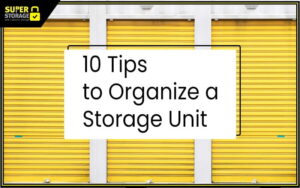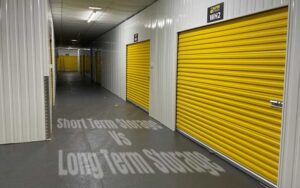Like most people, you probably have a lot of books. Whether they are books you love to read, reference books you use for work, or memorabilia you enjoy looking at, finding a place to store these can be challenging. It is important that your books are kept in an environment that protects them and keeps them preserved.
Self Storage for Books
When deciding where to store your belongings, it’s important to choose a storage facility that meets your book storage needs. Self-storage units typically have features like climate control and security features that can make your experience with the facility smoother and more secure. A self-storage unit is a great way to keep items in the house out of sight and allow extra living space. These units can be used for everything from excess furniture and seasonal decorations to business records and inventory storage.
Benefits of Self-Storage for Storing Books
Books are heavy. They take up a lot of space. When people move frequently or live in small spaces, they might not have enough room for all their books. A solution to this is self-storage.
The first thing to note about storing books in self-storage is that you don’t need a large storage unit for them. You can often fit hundreds of books in just one section of a larger unit. But if you have a lot of them, it is worth noting that many facilities do offer special units just for books and other media. If you’re not sure how much storage space you’ll need, it is worth taking an inventory of your book collection before renting a unit.

Self-storage facilities should also be relatively safe from natural disasters like floods and fires, with some offering insurance against those risks as well. Because the items in your storage unit are so valuable to you, it’s worth reading through the facility’s policies about conditions in their units and whether they will help you clean out your unit if you must vacate it for any reason.
The storage space we have at home is not ideal for books. It can get dusty, and it’s not dark enough to protect them from sunlight. We considered storing our books in a self-storage unit, but there are some factors to consider before you make this decision.
Self-storage units are climate-controlled, which means that your book collection will be protected from moisture, temperature fluctuations, and pests. This can be important for preserving the quality of older books or for protecting those that you want to resell at some point. Also, because self-storage units are usually in industrial areas, they tend to be quiet and secure. This makes them a good choice for storing valuable collections or items that can’t fit into your home (for example, when we were moving cross-country).
Some facilities also offer services for storing more than just books, such as records and CDs, it may be worth looking into these options as well if your collection includes these things.
Decide If You Actually Need a Storage Unit for Storing Books?
If all you need are a few boxes to store some books, and you don’t have the space to stack them on the floor of your home or apartment, it might be tempting to put them in a self-storage unit. But that’s not always necessary.
self-storage unit is not the only option for storing books. If you’re at that point where you need to put things in storage, you should try to consolidate as much as possible. If there are duplicates, donate the extras and focus on just one set of books. If there are books that were published before 1970, and can’t be easily replaced, then those would be good candidates for self-storage.
If you’re storing an excess of books in your home while also living with limited space, you might consider renting out a self-storage unit instead. The peace of mind that comes with storing valuables offsite can give you the freedom to live minimally and more comfortably. So always keep in mind when deciding whether or not self-storage is right for your needs.
Tips to Store Books in Storage Unit
Following are the tips that will help you while storing your books in a self storage unit,
- Use Sterilize Rolling Carts for Easier Packing
They’re made of solid steel, making them extremely strong and durable, while also being easy to wheel around. They’re available in a range of sizes and color options, which means you can find absolutely the right one for your needs.
Sterilize makes rolling carts that are designed with the specific purpose of moving your books. Now you don’t have to worry about stacking them on top of each other because they’ll be separate from everything else.
The Sterilize rolling carts help in easing out the process of packing books. With the help of these carts, each and every book is packed properly. - Store Books in Sturdy Boxes
Books are heavy, delicate, and easily damaged. If you’re moving, storing them in boxes is a great way to keep them safe and organized. In order to protect your books from damage, look for sturdy boxes that can hold the weight of several books at once. - Add a Damp Rid Packet to Absorb Moisture
Moisture is the enemy of books. Moisture that gets into a book and sits for a long time will cause the paper to break down and eventually crumble. The best way to keep moisture from getting into books is to keep them in a cool, dry place, but sometimes this isn’t enough. A simple way to prevent this is by putting a packet of Damp Rid inside each book you store. Damp Rid contains a chemical that absorbs moisture. Each packet will absorb up to one quart of liquid and keep it from seeping into the pages of your books. - Use Bubble Wrap on Musty Books
If your books have an old, musty smell to them, you can either air them out or place them in a smaller plastic bag with bubble wrap. The plastic will help to prevent moisture from seeping into the pages of your book while keeping it protected from dust and dirt. - Store Books Vertically
It’s a common practice to store books on shelves horizontally, but there’s a better way. When you keep them vertically, you can fit more into a smaller space and make a room look larger. It’s also easier to display and access the books, which is great if you’re something of a bibliophile and want to show off your collection. - Seal Boxes with Packing Tape
Sealing boxes with packing tape is the best way to keep them airtight and protect their contents during transit. Packing tape adheres to cardboard, plastic, and glass surfaces, leaving a clean finish that doesn’t leave behind any sticky residue. If you’re sealing a box that’s not filled to capacity or that has items inside that will compress, it’s best to use a wider tape like Kraft paper tape, it’ll give you a stronger seal without crushing your package.
Need packaging material for your storage unit? visit
https://super-storage.co.uk/packing-equipment-stoke-on-trent - Have an Inventory List of Your Books
It is a good idea to create an inventory list of your books before you store them. When you write a book inventory list, you will know exactly how many books you have in storage. You can use the inventory list at any time in the future when you want to retrieve some of your books from storage. The list can help you keep track of the condition of each book. - Layer Heavy Books on the Bottom and Lighter Ones on Top
Many people who store books end up having them fall over and become crooked, resulting in a mess. Rather than just throwing them into boxes, there is a better way to store your books. To store your books upright, follow this three-layer method.
Layer 1: Place the heaviest books on the bottom. These usually reference books or cookbooks.
Layer 2: Place the second heaviest books next to these books. These are usually your thickest novels or travelogues.
Layer 3: Place your lightest books on top of these thick ones. These are usually newspapers and magazines that you don’t need to refer to often. This will keep your bookcase upright for the long haul. - Store the Books Alphabetically by Author or Category
It’s important to consider how you will store your books. You can place them by category, or alphabetically by author. The first option is great for readers who have a specific interest in particular subjects (e.g., art books or science fiction). The second option is perfect for those who read broadly and want to be able to browse their collection easily when they’re searching for a new book to read. - Store Books off the Floor to Prevent Damage from Condensation
When storing books in a humid environment, it’s important to keep them off the floor and out of contact with the ground. If they’re stacked directly on the floor, they will absorb moisture from the air and potentially cause damage due to rotting and crumbling pages. - Climate Control is a Must with Storing Books
Climate control units are a must-have item for book storage, since books need to be kept in a place with consistent temperature and humidity. The standard Climate control units is an ideal choice for libraries and other stores of books.
Wrapping Up
There’s not much to think about when it comes to storing books. And since you are storing them in a climate-controlled environment, you can rest easy knowing that they’ll be kept safe from the environment. Just make sure to keep them in durable moving boxes, then stack them on a shelf, and you’ll have no trouble finding them whenever you need them.
Never underestimate the value of a neatly organized storage space. Books should always be stored on their backs with solid supports underneath to prevent wrinkling and bending. Taller books should be bound vertically rather than horizontally, as this will allow for greater storage space within the same area.
Are you looking for a Free Consultation for your storage needs?Click Here !




